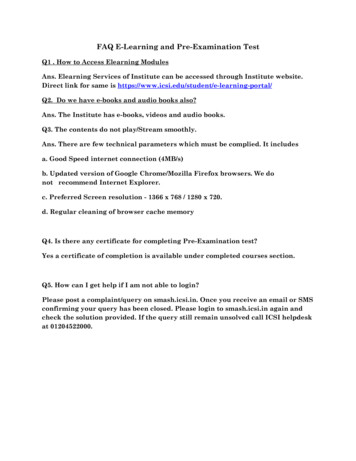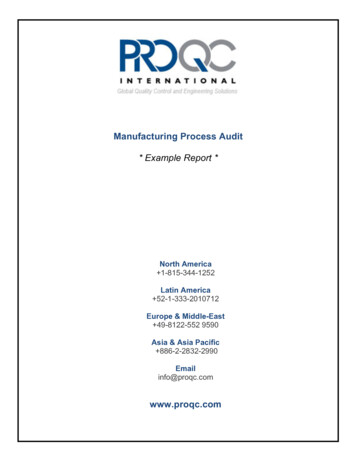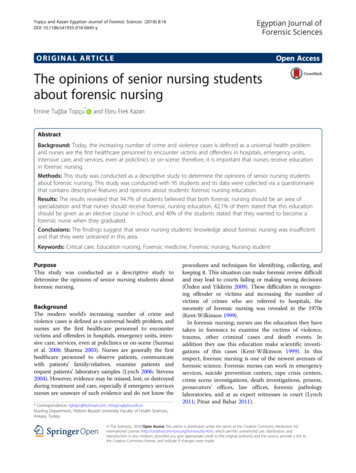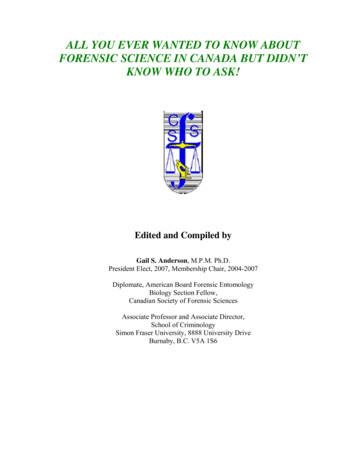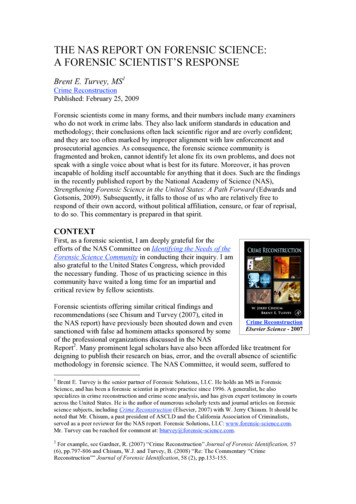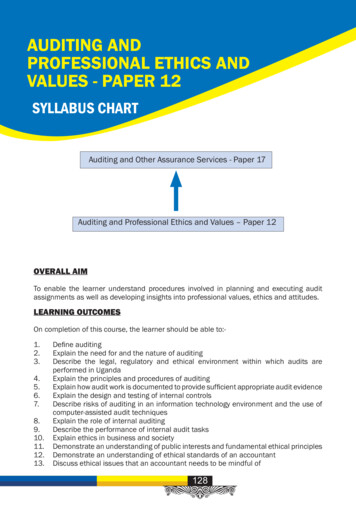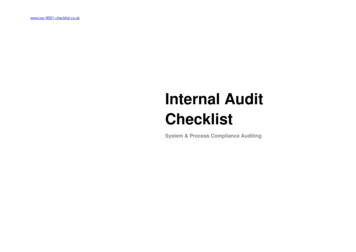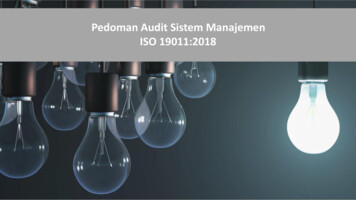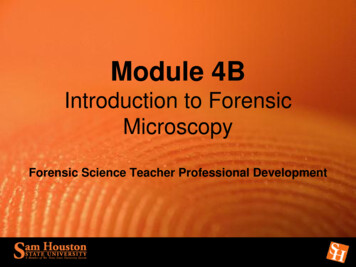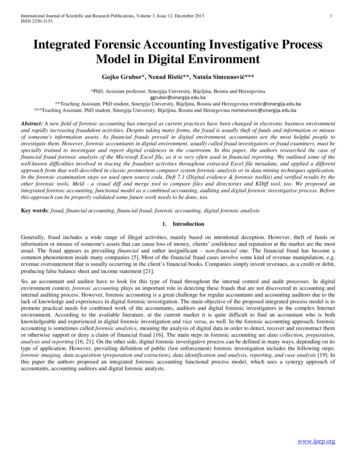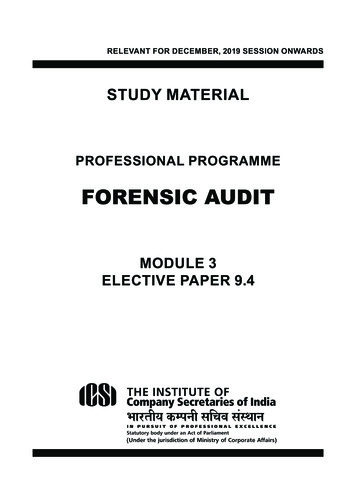
Transcription
RELEVANT FOR DECEMBER, 2019 SESSION ONWARDSSTUDY MATERIALPROFESSIONAL PROGRAMMEFORENSIC AUDITMODULE 3ELECTIVE PAPER 9.4i
THE INSTITUTE OF COMPANY SECRETARIES OF INDIATIMING OF HEADQUARTERSMonday to FridayOffice Timings – 9.00 A.M. to 5.30 P.M.Public Dealing TimingsWithout financial transactions – 9.30 A.M. to 5.00 P.M.With financial transactions – 9.30 A.M. to 4.00 i.eduE-mailinfo@icsi.eduLaser Typesetting by AArushi Graphics, Prashant Vihar, New Delhi, andPrinted at M P Printers/June 2019ii
PROFESSIONAL PROGRAMMEFORENSIC AUDITIndia is leading its way towards attainment, progress and growth with global recognition as one of the fastestgrowing economies of the contemporary world. This emerging face of India is indeed a capture of spiritedgovernment’s reform and initiatives under the realm of Good Governance.The contemporary lead of good governance, which revolves around five ‘E’s being ‘Effective, Efficient, Easy,Empower, and Equity’ calls for an accountable, transparent and developed face of a globally recognized welfarestate.In this direction, we are adopting a highly collaborative approach and addressing challenges like fraud, deceit,financial misplacement and alike, which are hindering the inclusive growth of India. Inter-alia, where fraudis considered as one of the critical ailments, which not only holdup the corporate organizations where it hasbeen conducted, rather it shakes the entire economy sometimes with temporary effects and sometimes withpermanent ones, it has always been the priority of growing economies including India to detect, prevent andregulate the menace of fraud in the larger interest of the nation.In this selection of timely detection, prevention and regulation over corporate fraud and reference to dueinvestigation, Forensic Audit is having an imperative role in assisting the corporates for maintaining efficiencyand merit. On the larger parameters, Forensic audit as tool-mix of accounting and investigation is serving all thefive E’s of good governance and make the corporates to grow and develop on the parameters of being Effective,Efficient, Easy, Empower, and Equity’In this background, where forensic audit is considered as a need of the hour for enhancing the corporate cultureof India, varied roles are played by the Company Secretaries in the field of Forensic Audit. Further, the presentday progressive changes in the Forensic Audit are expanding the gateway of opportunities for the professionalsto guide, advice, operationalize, and appear in the matters related to Forensic Audit.The Institute of Company Secretaries of India (ICSI), while persistently playing a pivotal role in building capacitiesof its members has decided to provide a 360 degree rounded set of learning to the students along with apprisingthem with the advanced changes in the arena of Forensic Audit and their directed implementation.Therefore, this study material has been prepared to provide the students with a wide perspective and in-depthknowledge in forensic audit to enable them to get solid grounding in the legislative framework, practice andprocedure of the forensic audit. The course contents of this study material have been so designed as to developspecialised skills in the corpus and complexities of the different aspects of the subject besides meeting therequirements of a future career in this area.The domain of forensic audit is vast. Every effort has been made to provide a self- contained material and anintegrated approach has been adopted throughout.This study material may therefore be regarded as basic material and must be read along with the Bare Act,Rules, Regulations, Case Laws, Chartered Secretary as well as suggested readings. The study materialis based on those sections of the relevant laws and the rule made there under which have been notifiedby the Government of India (including Amendments/clarifications/circulars issued there under up to April,2019).The students to be conversant with the amendments to the laws made up to six months preceding the date ofiii
examination. It may happen that some developments might have taken place during the printing of the studymaterial and its supply to the students.The students are therefore advised to refer to the updations at the Regulator’s website, Supplement relevant forthe subject issued by ICSI and ICSI Journal Chartered Secretary and other publications for updation of studymaterial. In the event of any doubt, students may contact the Directorate of Academics at academics@icsi.edu.Should there be any discrepancy, error or omission noted in the study material, the Institute shall be obligedif the same are brought to its notice for issue of corrigendum. Although due care has been taken in publishingthis study material, yet the possibility of errors, omissions and/ or discrepancies cannot be ruled out. Thispublication is released with an understanding that the Institute shall not be responsible for any errors, omissionand/or discrepancies or any action taken in that behalf.iv
THE LIST OF LAWS COVERED UNDER THE STUDYBankers Books Evidence Act, 1891Companies Act, 2013Companies (Audit and Auditors) Rules, 2014Companies (Auditors Report) Order, 2016Comptroller and Auditor-General’s (Duties, Powers and Conditions of Service) Act, 1971Contract Act, 1872Criminal Procedure Code, 1973Finance Act, 2018Foreign Corrupt Practices Act, 1977ICSI Anti Bribery CodeIncome Tax Act, 1961Indian Evidence Act, 1872Indian Penal Code, 1860Informational Technology Act, 2000Insurance Act, 1938OECD Guidelines for Multinational Enterprises relating to Combating BriberyPrevention of Corruption Act, 1988Prevention of Money Laundering Act, 2002 (PMLA)Prohibition of Benami Property Transactions Act, 1988SEBI Act, 1992SEBI (Acquisition of Shares & Takeovers) Regulations, 1997SEBI (Prohibition of Insider Trading) Regulations, 1992United Kingdom Bribery Act, 2010v
PROFESSIONAL PROGRAMMEMODULE 3PAPER 9.4FORENSIC AUDIT (MAX MARKS 100)SYLLABUSObjective: To understand and analyse the concept of Corporate Fraud and Forensics Audit in the contemporaryworld along with the legal mechanism to counter the corporate fraud and understanding Forensic Audit and itsmethods.Detailed Contents:1.2.3.Introduction What is Fraud Meaning and Definition under the Companies Act, 2013 and Criminal Procedure Code, 1973 Elements of Fraud What is Audit; Forensic Audit Need and Objectives Fraud and Forensic Audit Forensic Audit vis-a-vis AuditFraud and Audit Modern Day Scenario Fundamentals of Forensic Audit Fraud related Concepts Kinds of Frauds Corporate Frauds: An Insight Live Cases Directors’ ResponsibilitiesAudit and Investigations Tools for handling Forensic Audit and the Role of Company Secretary Investigation Mechanism Field Investigations Methods of Investigations Red Flags Green Flagsvi
4.5.6.7.Forensic Audit : Laws and Regulations Information Technology and Business Laws International Laws and Practices; UK Bribery Act US Foreign Corrupt Practices Act Indian Laws ICSI Anti Bribery CodeForensic Audit and Indian Evidence Law Finding Facts Relevant Facts Admission of Evidence Methods to Prove CasesCyber Forensics Introduction to Cyber Crime International Guidance to Cyber Forensics Laws Digital Forensics and Cyber Laws Introduction to Data Extraction Digital Forensics and Cyber Crime Ethical Hacking Digital Incident Response Case Laws: Indian and InternationalCase Laws, Case Studies and Practical Aspectsvii
LESSON WISE SUMMARYFORENSIC AUDITLesson 1 – IntroductionIn the selection of timely detection, prevention and regulation over corporate fraud and reference to dueinvestigation, Forensic Audit is having an imperative role in assisting the corporates for maintaining efficiencyand merit. On the larger parameters, Forensic audit as tool-mix of accounting and investigation is serving all thefive E’s of good governance and make the corporates to grow and develop on the parameters of being Effective,Efficient, Easy, Empower, and Equity’. In this background, where forensic audit is considered as a need of thehour for enhancing the corporate culture of India, this chapter covers the verve of the forensic audit includingthe meaning, definition, objectives and significance of forensic audit.Lesson 2 – Fraud and AuditIn the contemporary era, Government of India is adopting a highly collaborative approach and addressingvarious challenges like fraud, deceit, financial misplacement and alike, which are a big hindrances in the path ofinclusive growth of corporates in India. Among other things, ‘fraud’ in one of the most critical ailments which notonly holdups the corporate organizations where it is conducted, rather it shakes the economy of entire countrywhich has both short term as well as long term impact. In this whole process of timely detection of frauds andreference of such case for due investigation, Forensic Audit has an imperative role in assisting the corporatesto maintain efficiency as well as merit at par. In the larger perspective, this lesson aims to apprise the studentswith modern day scenario of forensic audit, fundamentals of forensic audit along with other related concepts.Lesson 3 – Audit and InvestigationsRight from conducting forensic audit to examining the evidences, from finding the culprit behind the fraud toappearing in the court for submitted the testimony, a Company Secretary is apt in serving his professionalexcellence as a forensic auditor.To summarize, where forensic audit is a detailed engagement which requires the expertise of not only accountingand auditing procedures but also expert knowledge regarding the legal framework, and a forensic auditor isrequired to have an understanding of various frauds that can be carried out and of how evidence needs to becollected.In this context, Company Secretary is a Catalyst in Upholding Good Governance via Forensic Audit. His rolein specific to Forensic audit is the main objective of this lesson. Henceforth, the lesson aims to provide a clearunderstanding to the matters including Tools for handling Forensic Audit and the Role of Company Secretary;Investigation Mechanism; Field Investigations; Methods of Investigations; Red Flags; Green Flags and alike.Lesson 4 – Forensic Audit: Laws and RegulationsA forensic audit is an examination and evaluation of a firm’s or individual’s financial information for use as evidencein the court of law. A forensic audit can be conducted in order to prosecute a party for fraud, embezzlement orother financial claims. In order to understand the legal consequences that a person attracts on being caught ina forensic audit, it is necessary to know about the various statutes that talk about the implementation of forensicaudits in India. Therefore, this lesson aims at providing the basic understanding as to the laws, regulations andstatues, nationally as well as internationally, dealing will corporate laws and empowering forensic auditors inperforming their duties in its true letter and spirit.viii
Lesson 5 – Forensic Audit and Indian Evidence LawIn order to prove a case in the court of law and to penalize the wrong doers, the matter must be proved beyondreasonable doubt. For this purpose, one must adduce relevant evidences in the court of law. The similar contextis applicable for proving the corporate fraud and the person behind it through the use of forensic audit reports.Therefore, this lesson deals with the concepts of evidence law in reference to forensic audit. In specific, it dealswith Finding Facts; Relevant Facts; Admission of Evidence; Methods to Prove Cases.Lesson 6 – Cyber ForensicsThe impact of Information and Communication Technology is very profound. Both Society and the Technologyare operating in a way so as to harmonize with the pace of each other’s growth. As the World is developing,more technology is emerging with each passing day and thus there is more development taking place in thesociety. All the facets of human life including education, health, entertainment and communication are beinginfluenced by and have been impacted by the advent of the Information and Communication Technology. Thisway, Information Technology is rightly called as a boon.With boon goes the bane, so is the case with Information and Communication Technology. One of the majorchallenges in this era of ICT is of an increasing number of cyber-crimes taking place in the World today.Corporate Frauds are not the exception to it.In the light of corporate frauds executed via the means of Information Technology, a new branch of forensicaudit called Cyber Forensics audit has emerged in the contemporary world.In this perspective, this chapter aims to apprise the students with concepts like Cyber Crime; InternationalGuidance to Cyber Forensics Laws; Digital Forensics and Cyber Laws; Introduction to Data Extraction; DigitalForensics and Cyber Crime; Ethical Hacking, Digital Incident Response and alike.Lesson 7 – Case Laws, Case Studies and Practical AspectsIn order to apprise the students, with the applied issue of Forensic Audit and its procedure in the legal regimein India, the chapter aims providing the gist of some leading case laws related to Forensic Audit. It also providea glimpse of practical aspects of the Forensic Audit and its procedure with the discussion of a case study too.ix
LIST OF RECOMMENDED BOOKSPaper 9.4: Forensic Audit1.Crain at el:Essentials of Forensic Accounting2.Crumbly at el:Case Studies in Forensic Accounting and Fraud Auditing3.Davis Chris:IT Auditing Using Controls to Protect Information Assets4.Field C D:Commentary on Law on Oral and Documentary Evidence5.Godbole Nina:Cyber Security6.Joshi Apporva:Students’ Handbook on Forensic Accounting7.Keane Adrian:The Modern Law of Evidence8. Mark J. Nigrini:Forensic Analytics: Methods and Techniques for ForensicAccounting Investigations9. Shields Greg:Accounting: What the World’s Best Forensic Accountants andAuditors Know About Forensic Accounting and Auditing – That YouDon’t10.Shraibman and Sampath:Forensic Accounting for Dummies:All India Reporter Ltd., Congress Nagar, NagpurJournals1.All India Reporter2.Chartered Secretary (Monthly) :The ICSI, New Delhi-110 0033. e-Bulletin ( Student Company :Secretary’)The ICSI, New Delhi-110 0034.Journal on Audit5.Journal on Forensic Audit6. Journal of Forensic andInvestigative Accounting7.Students Professional Today:The ICSI, New Delhi-110 003Note :1.Students are advised to read the above journals for updating the knowledge.2.Students are advised to read/refer the latest editions of the recommended books.3.Students are also advised to read legal glossary/legal terms given in Study Materialx
ARRANGEMENT OF STUDY LESSONModule-3 – Paper-9.4FORENSIC AUDITSr. No.Lesson Title1.Introduction2.Fraud and Audit3.Audit and Investigations4.Forensic Audit: Laws and Regulations5.Forensic Audit and Indian Evidence Law6.Cyber Forensics7.Case Laws, Case Studies and Practical Aspectsxi
CONTENTSLESSON 1INTRODUCTIONIntroduction2What is Fraud3Meaning and Definition under the Companies Act, 2013 and Criminal Procedure Code, 19734Meaning and Definition under Companies Act, 20134Meaning and Definition under Criminal Procedure Code, 19736Meaning and Definition under Indian Penal Code, 18606Meaning and Definition under Indian Contact Act, 18726Definition of Fraud: The Judicial View7Elements of Fraud7Examples – Corporate Fraud9Forensic Audit: Meaning and Significance10Meaning of Audit11Audit: An Adhering Significance12Stages of Audit13Meaning of Forensic Audit13Significance of Forensic Audit14Key Benefits of Forensic Audit15Need and Objectives: Forensic Audit17Fraud and Forensic Audit : An Introspect18Forensic Audit vis-à-vis Audit19LESSON ROUND UP20SELF-TEST QUESTIONS21LESSON 2FRAUD AND AUDITModern Day Scenario24Forensic Audit: Leading Way to Emergent Economy25Fundamentals of Forensic Audit27Fraud related Concept29Kinds of Frauds30xii
Kinds of Fraud in specific to Economy and Financial Transactions31Corporate Frauds : An Insight32Live Cases33The Modus Operandi33Directors’ Responsibilities34Director’s Personal Liability35Criminal Liability35Lifting of Corporate Veil35Ultra Vires36Fraud on Minority36Actions against Directors by SEBI36Liability under Prevention of Money Laundering Act, 2002 (PMLA)36LESSON ROUND UP36SELF-TEST QUESTIONS37LESSON 3AUDIT AND INVESTIGATIONSTools for handling Forensic Audit40Forensic Audit Thinking (Thinking Forensically)40Forensic Audit Procedures40Tools for handling Forensic Audit and the Role of Company Secretary42Role of CS as a Forensic Auditor44Power and Duties of Auditors and Accounting Standards47Investigation Mechanism53Types of Investigations55Methods of Investigations56Finding Facts and Conducting Investigations : A Process Exemplified58STEP ONE: Begin the case (respond to complaint, etc.)60STEP TWO: Evaluate the allegations or suspicions61STEP THREE: Conduct due diligence background checks61STEP FOUR: Complete the internal stage of the investigation61STEP FIVE: Check for predication and get organized61STEP SIX: Begin the external investigation62STEP SEVEN: Prove Illicit Payments62xiii
STEP EIGHT: Obtain the cooperation of an inside witness63STEP NINE: Interview the primary subject65STEP TEN: Prepare the final report65Red Flags66Green Flags67LESSON ROUND UP68SELF-TEST QUESTIONS69LESSON 4FORENSIC AUDIT : LAWS AND REGULATIONSIndian Laws : Information Technology and Business Laws72Companies Act, 201372Fraud Reporting under Companies Act, 201373SEBI Act, 199275Information and Technology Act, 200076Insurance Act, 193876The Companies (Auditor’s Report) Order, 201676Penalty under the Prevention of Corruption Act, 1988 (PC Act)76The Prevention of Corruption (Amendment) Act, 2018: An Abridged76Backdrop of the Amendment Act76Highlights of the The Prevention of Corruption (Amendment) Act, 201878Income Tax Act, 196179Indian Penal Code, 186080International Laws81United Nations Convention Against Corruption (UNCAC)81OECD Guidelines for Multinational Enterprises relating to Combating Bribery82The Integrity Pact (IP)82Foreign Corrupt Practices Act, 1977 (U.S.A.)82The United Kingdom Bribery Act, 201083ICSI Anti Bribery Code85ICSI Anti-Bribery Code: A Way Ahead86LESSON ROUND UP87SELF-TEST QUESTIONS88xiv
LESSON 5FORENSIC AUDIT AND INDIAN EVIDENCE LAWFinding Facts90Question of Law and Question of Fact91Materiality and Facts-in-issue92Relevant Facts93Relevancy94Types of Relevancy and Test to Determine Relevancy95Admissibility and Weight of an Evidence96Admission of Evidence96Section 1798Admission to be used as a whole and unambiguous.99Mode of proof of admissions99Section 18100Persons whose statements are admissions100Statements of parties suing or sued in a representative character100Section 19101Section 20102Section 21103Section 22104Section 22A104Section 23105Methods to Prove Cases105Oral Evidence106Documentary Evidence108Proving a Matter through Evidences On the Basis of Sources111Direct evidence111Circumstantial evidence111Other kinds of evidence112LESSON ROUND UP114SELF-TEST QUESTIONS115LESSON 6CYBER FORENSICSIntroduction to Cyber Crime118xv
Cyber Crime-: Meaning and Definition119International Guidance to Cyber Forensics Laws120Necessity of International Standards120Introduction to Data Extraction124Advantages of Using Data Extraction Tools125Ethical Hacking125Cases : Indian and International126Official Website of Maharashtra Government Hacked126Official Website of IRCTC Hacked126CBI Website Hacked127ICICI- Pune Bank Fraud case127Pune Citibank Mphasis Call Center fraud128Parliament attack case128Andhra Pradesh tax case128Insulting Images of Warrior Shivaji on Google - Orkut129India’s First ATM Card Fraud129Chennai’s Violation of Software Terms130Napster Case130LESSON ROUND UP130SELF-TEST QUESTIONS131LESSON 7CASE LAWS, CASE STUDIES AND PRACTICAL ASPECTSCase Laws134Sahara Group Scam134Satyam Computers134Saradha Chit Fund135Ketan Parekh Scam135Case Studies: Practical Aspects135Case Study – 1: Collusive Bidding by Contractors135Case Study – 2: NSEL – FTIL Case136Case Study – 3: Bank Fraud Case137Case Study – 4: Corruption and Bribe Case139BIBLIOGRAPHY & References144xvi
Lesson 1IntroductionLESSON OUTLINELEARNING OBJECTIVES–Introduction–What is Fraud–Meaning and Definition under the CompaniesAct, 2013 and Criminal Procedure Code,1973–Meaning and Definition under CompaniesAct, 2013–Meaning and Definition under CriminalProcedure Code, 1973–Meaning and Definition under Indian PenalCode, 1860–Meaning and DefinitionContact Act, 1872–Definition of Fraud: The Judicial View–Elements of Fraud–Examples – Corporate Fraud–Forensic Audit: Meaning and Significance–Meaning of Audit–Audit: An Adhering Significance–Stages of Audit–Meaning of Forensic Audit–Significance of Forensic Audit–Key Benefits of Forensic Audit–Need and Objectives: Forensic Audit–Fraud and Forensic Audit: An Introspect–Forensic Audit vis-à-vis Audit–LESSON ROUND UP–SELF-TEST QUESTIONSunderIn the selection of timely detection, preventionand regulation over corporate fraud and referenceto due investigation, Forensic Audit is havingan imperative role in assisting the corporatesfor maintaining efficiency and merit. On thelarger parameters, Forensic audit as tool-mix ofaccounting and investigation is serving all the fiveE’s of good governance and make the corporatesto grow and develop on the parameters of beingEffective, Efficient, Easy, Empower, and Equity’. Inthis background, where forensic audit is consideredas a need of the hour for enhancing the corporateculture of India, this chapter covers the verve ofthe forensic audit including the meaning, definition,objectives and significance of forensic audit.Indian1
2PP-FAIntroductionIn general, Forensic Audit represents an area of finance that combines detective skills and financial acuity. Theforensic audit professionals dig deep into financial reports, locate financial transactions and figure out whatreally happened at various companies and who is the real culprit behind any fraud which has taken place in thecompany.They cover areas such as:1.Frauds Finding,2.Fraud detection and prevention techniques;3.Fraud related auditing;4.Investigation and analysis of financial evidence;5.Development of computerized applications to assist in the analysis and presentation of financialevidence;6.Communication of findings in the form of reports, exhibits and collections of documents; and7.Assistance in legal proceedings, including testifying in court as expert witness and preparing visual aidsto support trial evidence, etc.1Further, Forensic Auditing is used in a number of ways and for a number of purposes and not just for criminalactivity detection. Firms that do “turn-arounds” or takeovers of businesses, for example, need to have an indepth understanding of their target’s finances. In that scenario, Forensic Audit provides a clear understandingof the financial position along with the connection of the communications related to that.1. See, Daga Jayesh, CISA on What is the Importance of Forensic Auditors.
1nIntroduction 3What is Fraud‘Fraud’, in general, refers to a wrongful or criminal deception practiced which is intended to result in financial orpersonal gain to oneself and a financial or personal loss to the other.As per Business Dictionary, ‘Fraud’ is an act or course of deception, an intentional concealment, omission, orperversion of truth, to:(1)Gain unlawful or unfair advantage,(2)Induce another to part with some valuable item or surrender a legal right, or(3)Inflict injury in some manner.2‘Wilful fraud’ is a criminal offence which calls for severe penalties, and its prosecution and punishment (like thatof a murder) is not bound by the statute of limitation.However, incompetence or negligence in managing a business or even a reckless waste of firm’s assets (byspeculating on the stock-market, for example) does not constitute an act of fraud, but yes, invites legal liabilities.In such cases, if the act of causing financial loss to the business or manipulating the stock market is attemptedwith the clear intention of deceit, this would tantamount to financial frauds.In law, fraud is a deliberate deception to secure unfair or unlawful gain, or to deprive a victim of a legal right.3Fraud can also be a civil wrong (i.e., a fraud victim may sue the fraud perpetrator to avoid the fraud or recovermonetary compensation), a criminal wrong (i.e., a fraud perpetrator may be prosecuted and imprisoned bygovernmental authorities) or it may cause no loss of money, property or legal right but still be an element ofanother civil or criminal wrong.The ultimate object of practising fraud may be some monetary gain or other benefit, such as, obtaining apassport or travel document, driver’s license or qualifying for a mortgage by way of false statements.4As per Black Law Dictionary, ‘Fraud’ refers to ‘All multifarious means which human ingenuity can devise, andwhich are resorted to by one individual to get an advantage over another by false suggestions or suppression ofthe truth. It includes all surprises, tricks, cunning or dissembling, and any unfair way which another is cheated.5’With the clear analysis of the abovedefinitions, it could be asserted that Fraudis a – False representation of a matter of fact; Whether by words or by conduct, byfalse or misleading allegations, or byconcealment of what should have beendisclosed; That deceives and is intended todeceive another; So that the individual will act upon it toher or his legal injury.2.3.4.5.Definition of Fraud, Business Dictionary, Business Dictionary.com.Definition of Fraud, Legal Dictionary, Law.com.Basic Legal Concepts, Journal of Accountancy.Black’s Law Dictionary, 5th ed., by Henry Campbell Black, West Publishing Co., St. Paul, Minnesota, 1979.
4PP-FA‘Fraud’ is commonly understood as dishonesty calculated for advantage. A person who is dishonest may becalled a fraudster. In almost all the legal systems, fraud is a specific offence with certain unique features.‘Fraud’ is most commonly practiced in the acts of buying or selling of property, including real estate, personalproperty, and intangible property, such as, stocks, bonds, and copyrights. Indian law under various statutescriminalizes fraud, but not all cases graduate to the level of criminality. Prosecutors also have discretion indetermining which case to pursue and which not. Victims may also seek redress in civil court, provided that thefraud conducted does not affect the society at large. For example, if a fraud is carried out in a company andhas adversely affected the profit generation in that company without in any was affecting any counter of theeconomy, the victims might seek relief under the civil remedy. On the other hand, if the fraud conducted in thecompany affects the entire economy altogether then the only way to punish the accused is through criminalprosecution against the accused under different criminal law statutes, including the Indian Penal Code, 1860along with the recovery of amount earned through fraudulent transactions. For instance, in the recent ill-fatedPunjab National Bank Scam, CBI added the charges of Criminal Breach of Trust under section 409 of IPC alongwith charges of Fraud under section 420 IPC, 1860.6As it is clear that fraud is recognized as an act of deceit which is subject to criminal as well as civil legalaction in almost all the jurisdictions, including India, hence, it would be apt to discuss the definition andmeaning of Fraud under specific laws like Companies Act, 2013, Criminal Procedure Code, 1973 andIndian Penal Code, 1860.MEANING AND DEFINITION UNDER THE COMPANIES ACT, 2013 AND CRIMINALPROCEDURE CODE, 1973Meaning and Definition under Companies Act, 2013Explanation of Section 447 of Companies Act 2013 defines Fraud and related terms as below:(i)‘Fraud’ in relation to affairs of a company or anybody corporate, includes any act, omission, concealmentof any fact or abuse of position committed by any person or any other person with the connivance in anymanner, with intent to deceive, to gain undue advantage from, or to injure the interests of, the companyor its shareholders or its creditors or any other person, whether or not there is any wrongful gain orwrongful loss;(ii)‘Wrongful gain’ means the gain by unlawful means of property to which the person gaining is not legallyentitled;(iii)‘Wrongful loss’ means the loss by unlawful means of property to which the person losing is legallyentitled.6. See, PNB Scam: CBI adds charge of Criminal Breach of Trust to FIR: Mehul Choksi, and Others may face life term if found guilty.
1nIntroduction 5In the context of this definition, it could be said that Corporate Fraud is a Fraud in relation to affairs of a companyor any corporate body as defined in the explanations of Section 447 of Companies Act 2013, which includes7a.Any act,b.Omission,c.Concealment of any fact ord.Abuse of position committed by any person or any other person with the connivance in any manner, i.with intent to deceive,ii.to gain undue advantage from, oriii.to injure the interests of,a.the company orb.its shareholders orc.its creditors or any other person,Whether or not there is any wrongful gain or wrongful loss.7. See, Pratyush Pandey (2014), Corporate Fraud Prevention Mechanism under Companies Act, 2013, Ipleader.
6PP-FAMeaning and Definition under Criminal Procedure Code, 1973The Code of Criminal Procedure, 1973 is the procedural law providing the machinery for punishment of offendersunder substantive criminal law. The Code contains elaborate details/provisions regarding the procedure to befollowed in every investigation, inquiry and trial, for every offence under the IPC or any other criminal law. Ingeneral, the Code does not provide for the definition of various terms rather it only describes certain limitedterms like Complaint, Cognizable Offence, Warrant Case and alike, which h
Lesson 4 – Forensic Audit: Laws and Regulations A forensic audit is an examination and evaluation of a firm’s or individual’s financial information for use as evidence in the court of law. A forensic audit can be conducted in order to prosecute a
